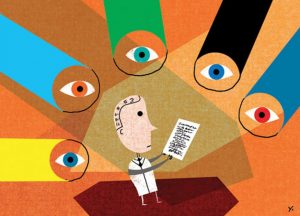The learning process of writing effectively while being conscious of the content openly available to all peers requires a great deal of strategizing and honest self-assessment. In this unit, our class was required to complete several assignments that included practicing writing application letters, email offers, memorandums, a definition, and a peer review on the definition written by your writing partner. From these assignments, I aimed to stay conscious of my work ethic and strategies to approach each assignment in order to reflect on them accurately and thoroughly. I noticed many habits, good and bad, that I have when completing assignments, and the different practices and choices I followed in order to produce the best product possible.
When I started strategizing for my assignment, I reread the instructions many times and as thoroughly as possible. I wanted to ensure that I met every requirement and suggestion listed in the assignment instructions. I found it somewhat difficult to find a term that was relatively complicated but could still be understood by non-technical readers. I changed my term several times in order to simplify or complicate the situation and my definitions of the terms. In the instructions, Dr. Patterson wrote that the audience and situation are a major component of the exercise, and I wanted to ensure that I chose an audience and situation that the students of English 301 could relate to and could understand without needing further clarification. I researched my definition profusely and ensured that I could explain my term thoroughly without any errors. I thought about level 100 courses and the way that textbooks provided definitions for terms in the first chapters and wanted to approach my definition assignment in the same way. I found that I had the most difficulty with condensing my explanations and avoiding adding unnecessary information to my definitions. The greatest strength that I found myself in this process was my ability to assess myself and my writing and adjust myself as I went along.

Can, AJ. “Explainer: What is Peer Review”, The Conversation. 18 Jun 2014
https://images.theconversation.com/files/50774/original/vtgbsqtx-1402449234.jpg?ixlib=rb-1.1.0&q=45&auto=format&w=926&fit=clip
The peer review process was helpful and productive. I enjoyed reading Phillip’s definition assignment and being able to think critically about how to enhance it. Being experienced with peer review, I understand that it is initially an awkward process, especially when you do not know the colleague you are assessing. The tone that needs to be used in order to come across as professional, friendly, and helpful is difficult considering that all communication is through an online basis with no body language, eye contact, or vocal tone to accompany the constructive criticisms. In reviewing my writing partner’s assignment, I wrote down components that I enjoyed and components that could be strengthened. By considering how I would want to be spoken to during a peer review session, I applied these same expectations to how I addressed Phillip. Personally, I enjoy peer review sessions and appreciate all constructive criticism. I aim to be better at everything I do and I want my peers to succeed with as much assistance I can offer as well. Phillip’s comments on his peer review of my definitions assignment were incredibly helpful and polite, and I appreciated his constructive feedback.
Phillip mentioned in my peer review that I should explain the litigation process, the other Alternative Dispute Resolution methods that I did not expand on, and to clean the aesthetic of the post in order to make each section more distinctive. I took all of Phillip’s feedback and edited accordingly. Phillip’s suggestions really enhanced my assignment and made the definition well-rounded and informative, as well as made me reconsider and fix the structure of my assignment. Attached to this post is my edited definitions assignment and Phillip’s peer review of my assignment for review. While editing, I also considered how to condense the material in my definition in order to present a straightforward explanation to my audience.
Overall, this unit has taught me professionalism, tone, and importance of audience and situation. I am really glad that I partnered with Phillip this term as he is very intelligent, open to constructive criticism, and has great communication skills. Our writing styles have their differences and I think it is helpful when it comes to peer review because we look for different things in our peer’s assignments than what we have already assessed in ourselves. A goal for the next unit is to complete assignments ahead of time in order to exchange assignments with my writing partner in order to initiate peer review of our own. I am looking forward to what next unit has in store for us.
English 301 – Jocelyn Toledo – Final Draft of Definition
English 301 – Peer Review on ADR by Phillip Wade